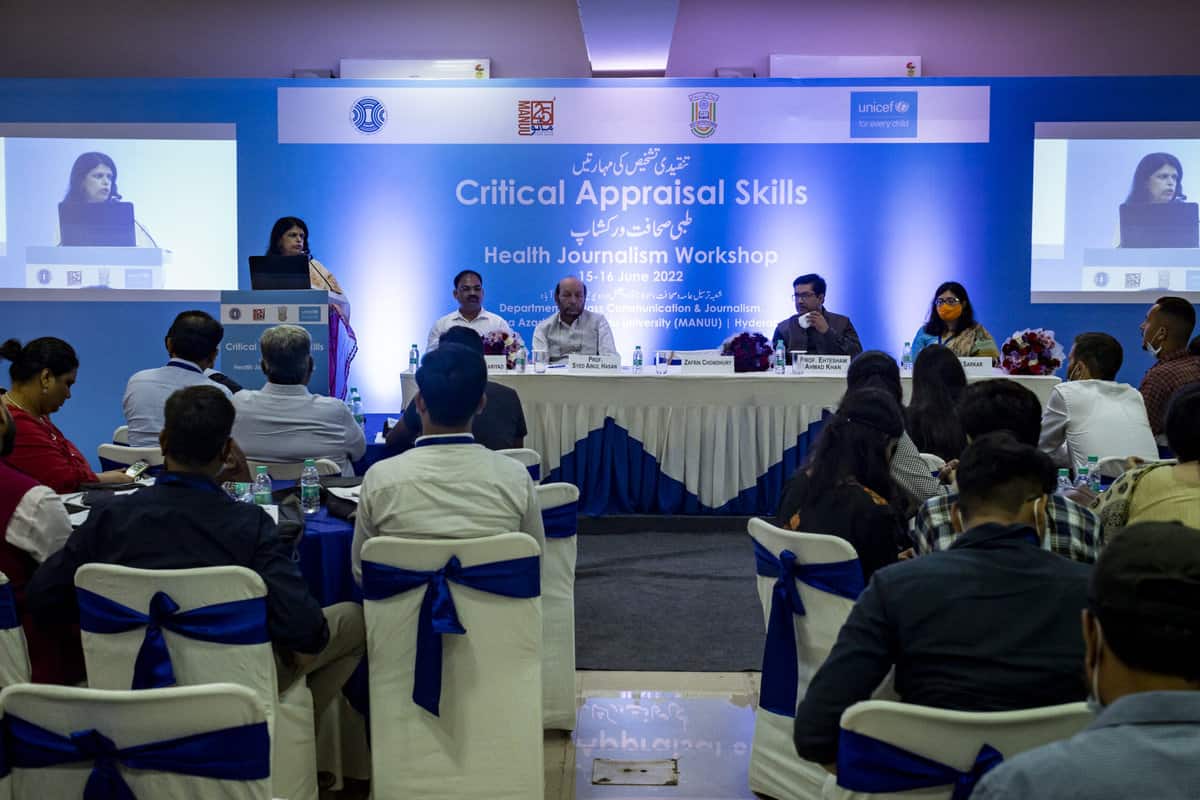
Hyderabad: A two-day workshop on evidence-based health journalism organized by the Department of Mass Communication and Journalism (MCJ), Maulana Azad National Urdu University (MANUU), in association with UNICEF concluded on Thursday.
Prof. Syed Ainul Hasan, Vice Chancellor, MANUU, said that the recent pandemic has driven the world’s attention towards the importance of health communication. Media can play a vital role in creating demand for immunization. Many of our journalists come from a non-medical background and the introduction of CAS at academic level helps them train in health journalism and encourage scientific mindset among masses, he added.
Over 120 students from MANUU, Indian Institute of Mass Communication (IIMC) and Himachal Pradesh University and health journalists who attended the workshop could learn about the importance of evidence-based reporting and fact-checking in health journalism – through UNICEF’s Critical Appraisal Skills (CAS) programme. The CAS programme, developed in 2014 by UNICEF, in association with Oxford University, Thomson Reuters and IIMC for working health journalists and students of journalism and mass communication, was later adapted as an elective module in their curriculum by IIMC and MANUU.
Speaking at the inauguration, Zafrin Chowdhury, Chief of Communication, Advocacy and Partnerships, UNICEF India said “UNICEF has long worked with the media on its critical role in building opinions and influencing people. The CAS course was developed in 2014 to strengthen skills in media professionals for accurate, balanced, analytical reporting and fact checking to guard against misinformation. The idea is to increase accurate and reliable media reports on issues that impact children, such as immunization, provide parents the right information and confidence to vaccinate their children and protect them from preventable childhood illnesses.”
Prof. Ehtesham Ahmed Khan, Dean, School of Mass Communication and Journalism, MANUU said CAS plays an important role in building a holistic 360-degree science-based communication narrative, addressing misinformation, promoting awareness, undertaking capacity-building of media, rigorous analysis of news reports, authoritative scientific discourses, thought series in media to counter any negative discourse.”
Dr NK Arora, Chairman, COVID-19 Working Group, National Technical Advisory Group on Immunization spoke on the COVID-19 vaccination and urged the media to find innovative ways to break through information fatigue and encourage eligible people to take all their doses of vaccine on time.
Prof. Sangeeta Pranvendra, Course Director, Department of English Journalism at IIMC, New Delhi said, “The COVID-19 pandemic put forth a situation where the media fraternity realised afresh the need to have well informed, critically thinking journalists who could play a positive role in reporting on health issues, informing the public and also avoiding misinformation. CAS goes a long way in evolving these skills in the journalism students.”
Sanjay Abhigyan, Executive Editor, Amar Ujala, Dehradun; and Pankaj Pachauri, Former Media Advisor to the Prime Minister and Editor, Go News were the speakers at the workshop. They said that the CAS is the first step towards becoming a Health Journalist and it has changed the way we think.
The participants, students and senior mentors shared their experiences of health reporting during the pandemic.



